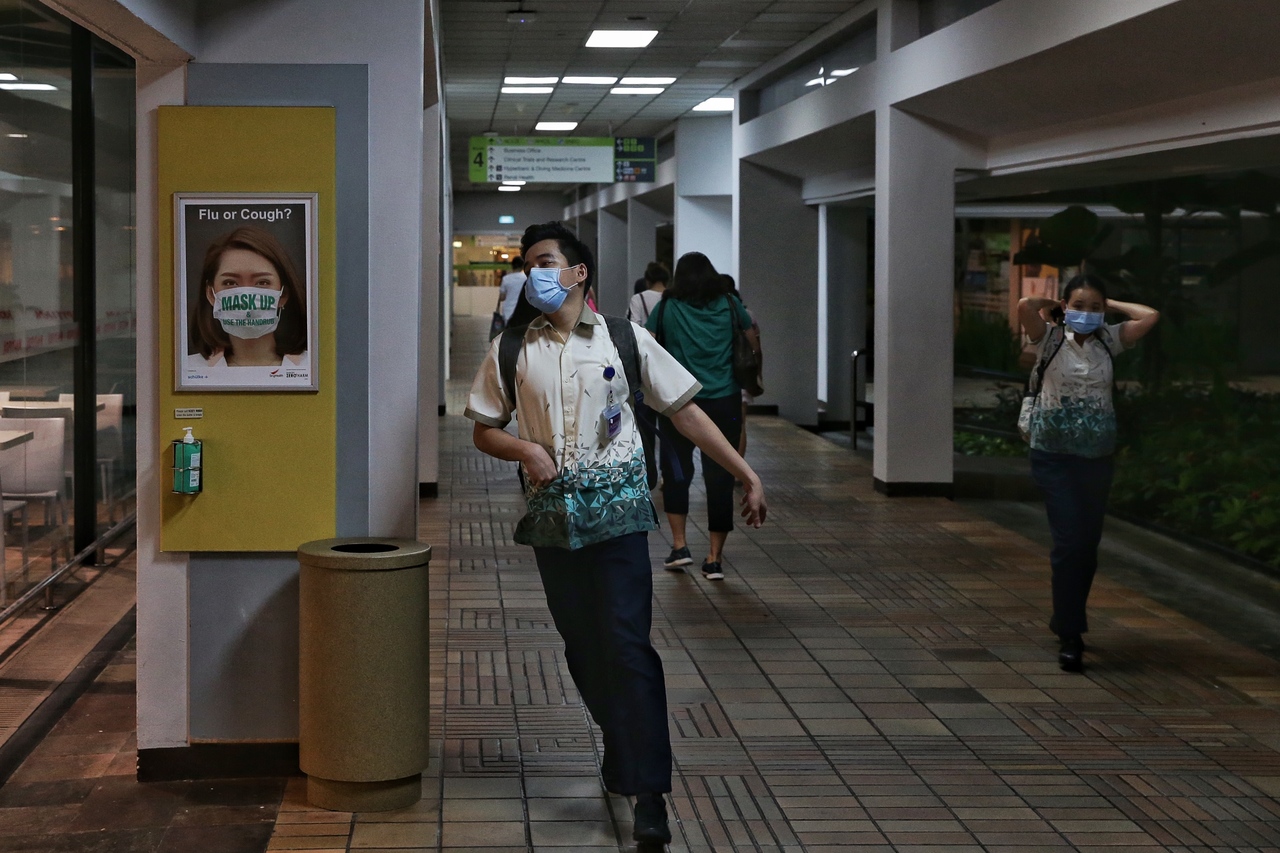Coronavirus: Transmission only via droplets and contact, say S'pore experts
Sign up now: Get ST's newsletters delivered to your inbox

Hospital staff with face masks walk past a poster in Singapore General Hospital on Jan 23, 2020.
ST PHOTO: KEVIN LIM
A panel of nine of Singapore's leading infectious disease experts gathered on Monday (Feb 10) to discuss the coronavirus outbreak and explain how researchers here are working to overcome the health problem.
The Straits Times posed several questions about the coronavirus to the panel:
Q: What do we know about the transmission of the virus?
A: "Following Sars, quite a bit of work has been done on the persistence of viral surfaces and most of the studies indicate that they don't persist very well in a hot, humid environment," said Professor Tan Chorh Chuan, chief health scientist at the Ministry of Health.
This refers to a temperature of over 30 deg C, and humidity of over 80 per cent. However, Prof Tan noted that this may vary slightly depending on the origins of the virus.
Quite a lot of work has also been done to ascertain which disinfectants work in disrupting viral particles, he added.
"The good news is that we have a hot, tropical environment and, therefore, in the outdoors, the likelihood of viral persistence is lower," he said.
Q: How are patients here contributing to research on the virus?
A: The majority of coronavirus patients here are eager to help researchers understand the outbreak, said Associate Professor David Lye, director of NCID's Infectious Disease Research and Training Office.
Many had agreed to offer samples before he could explain the procedure to do so in detail as mandated for such research.
Researchers need to take samples of throat swabs, blood, urine, stools and tears from patients to study the virus as well as people's immune response.
He said: "Some of them feel guilty and want to do all they can to help. We tell them, there is no reason for you to feel guilty. It is not your fault you are sick."
So far, 19 patients in Singapore have agreed to help researchers understand the virus better by donating samples. They include the very first patient, who is from Wuhan. Only two have refused so far, he said.
Researchers have yet to approach the more recently warded patients.
Q: Can the virus be transmitted via aerosol?
A: Prof Tan said that based on what is currently known, the method of transmission remains through large respiratory droplets and contact.
He added that this question was addressed at a news conference by China's National Health Commission on Sunday, where it was said that there is no evidence that the new coronavirus is transmitted through aerosols.
"Aerosols may be formed in special situations such as intubation procedures in hospitals," he said.
The expert panel included Professor Tan Chorh Chuan, chief health scientist at the Ministry of Health; Professor Leo Yee Sin, executive director at the National Centre for Infectious Diseases (NCID); Professor Lisa Ng, senior principal investigator at the Agency for Science, Technology and Research's (A*Star) Singapore Immunology Network; and Professor Wang Linfa, director of the Programme in Emerging Infectious Diseases at Duke-NUS Medical School.
The other members were Associate Professor Hsu Li Yang, programme leader for infectious diseases at the National University of Singapore's Saw Swee Hock School; Dr Sebastian Maurer-Stroh, deputy executive director of A*Star's Bioinformatics Institute; Associate Professor Raymond Lin, director of the National Public Health Laboratory at NCID; Dr Sidney Yee, chief executive officer at the Diagnostics Development Hub; and Associate Professor David Lye, director of NCID's Infectious Disease Research and Training Office.
Salma Khalik, Joyce Teo and Audrey Tan


